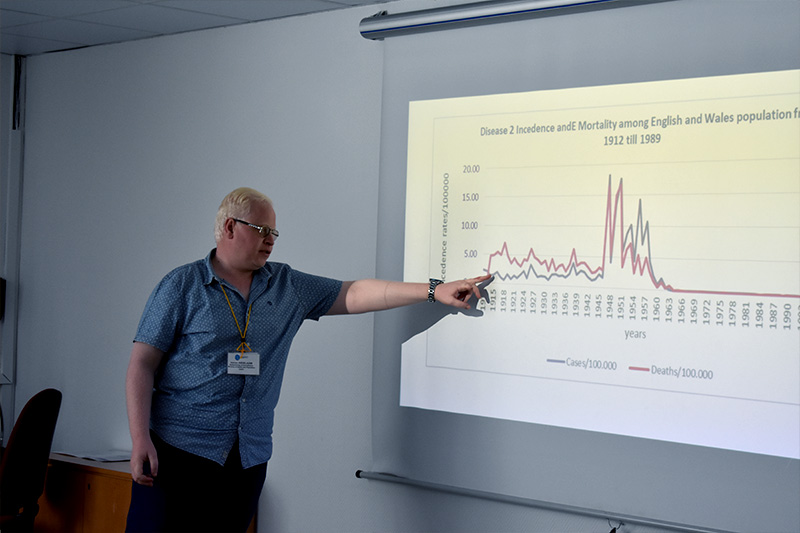Module 1 - Introductory course in intervention epidemiology
This first module for the Third MediPIET Cohort, 2019-21, “Introductory Course to Intervention Epidemiology” was organized 8-19th July 2019 at the National School of Public Health of Spain, Instituto de Salud Carlos III, Madrid, Spain.
The Module provided theoretical induction to allow MediPIET fellows and external participants of the MediPIET network for acquisition of the core competencies for field epidemiologist. Topics covered include how to perform surveillance, conduct outbreak investigations, design and interpret the results of epidemiological studies, perform a survey, collect and analyse data, and communicate the findings. Also, principles of International Health Regulations (IHR) and Chemical, Biological, Radiological and Nuclear (CBRN) risks mitigation and prevention were integrated with the main epidemiological content.
Dr Adela Páez and Dr Iro Evlampidou as MediPIET Scientific Coordinators, supported by Dr Isabel Noguer, ISCIII Leader for MediPIET Consortium, put together the contents and mobilized a group of 15 lecturers and facilitators, with large teaching and field experience. During the second week of the course the third Scientific Coordinator, Dr Angeliki Lambrou joined the team and the course.
A total of 21 participants attended the course, including fourteen fellows of the Third MediPIET Cohort from ten current training sites: Albania, Armenia, Georgia, Kosovo1, Lebanon, Moldova, North Macedonia, Palestine, Serbia and Ukraine. In addition, there was an external participant from each of the following countries: Algeria, Egypt, Jordan, Morocco and Tunisia and two of Montenegro, one of them self-funded.
At the end of the introductory course, participants were able to:
- Investigate an outbreak to propose public health recommendations;
- Perform surveillance and analyse surveillance data;
- Design an epidemiological study;
- Examine associations between exposures and outcomes, while taking into account bias, confounding and effect modification;
- Communicate results of field investigations to various stakeholders (decision makers, public, press, etc.), including scientific writing;
- Understand and apply IHR principles;
Be acquainted with CBRN Risk Mitigation and prevention principles, the EU CBRN and with the EU CBRN Centers of Excellence initiative:
Reflect upon the current challenges for prevention and control of vaccine preventable diseases;
Understand the specificities of surveillance of antimicrobial resistance.
According to participants’ satisfaction survey (95% response rate), the training course was very successful in terms of meeting their expectations, usefulness for their work, and networking opportunities. However, some people felt that the course was too advanced. The group showed a great cohesion very quickly with a strong willingness to support and learn from each other. In this sense, the training as induction for Cohort 3 was also very efficient.



